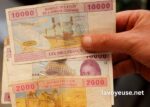In many African countries, understanding the conversion rates between different currencies is essential for both daily transactions and larger economic decisions. One of the most common conversions in the region is Euro en Cfa, which involves converting the European Euro into the CFA Franc. The CFA Franc is the official currency in several West and Central African nations, and the exchange rate between the Euro and Euro en Cfa plays a vital role in international trade, tourism, and personal finance in these regions.
The Euro en Cfa exchange rate is important for anyone dealing with financial transactions between Europe and countries that use the CFA Franc. Whether you’re a tourist, a businessperson, or a resident of one of the countries in the CFA zone, understanding how the Euro converts to Euro en Cfa will help you make informed financial decisions. The exchange rate fluctuates due to various factors such as global economic conditions, trade agreements, and political stability in both the Eurozone and the CFA countries.
What is the Euro en Cfa exchange rate?
The Euro en Cfa exchange rate refers to the amount of CFA Franc that can be exchanged for one Euro. This rate is determined by various factors such as supply and demand in the foreign exchange markets, economic conditions in the Eurozone and the CFA currency zone, and political events. The exchange rate between the Euro and Euro en Cfa is fixed for the most part, due to the fact that the CFA Franc is pegged to the Euro. This means that the value of the CFA Franc is tied to the Euro at a fixed exchange rate set by the central banks of the countries that use the CFA Franc.
Historically, the Euro en Cfa exchange rate has remained relatively stable due to this peg, which provides some predictability for people in the CFA zone who are conducting business or traveling to Europe. However, small fluctuations can still occur due to market forces, which can cause temporary variations in the rate. Understanding how Euro en Cfa works and how it affects international transactions is crucial for anyone involved in cross-border trade or personal finances between the Eurozone and the CFA Franc zone.
The stability of the Euro en Cfa exchange rate has both positive and negative effects. On the positive side, it ensures that there is less volatility in the value of the CFA Franc relative to the Euro, which is beneficial for trade, business, and savings. On the negative side, however, some critics argue that the fixed exchange rate system prevents the CFA zone countries from having full control over their monetary policy and exchange rates, which could help in times of economic distress.
How does the Euro en Cfa exchange rate impact trade?
The Euro en Cfa exchange rate has a significant impact on trade between the Eurozone and countries using the CFA Franc. Since the CFA Franc is pegged to the Euro, fluctuations in the Euro’s value directly affect the purchasing power of countries using the CFA Franc. When the Euro strengthens, the value of Euro en Cfa increases, making European goods and services more expensive for people in CFA countries. Conversely, when the Euro weakens, the Euro en Cfa value decreases, making imports from Europe cheaper for CFA countries.
For businesses engaged in international trade, understanding the Euro en Cfa exchange rate is crucial to pricing goods and managing costs. A stronger Euro means higher import costs for businesses in CFA countries, which could result in higher prices for consumers. On the other hand, a weaker Euro can benefit importers by reducing the cost of European goods, thus benefiting local economies in the CFA zone. However, this also has an impact on exporters from CFA countries who may find their goods less competitive on European markets when the Euro en Cfa exchange rate is unfavorable.
The Euro en Cfa exchange rate also affects trade agreements between the Eurozone and the CFA Franc zone. Governments and international organizations must consider these exchange rates when negotiating trade deals, especially those involving large volumes of goods and services. If the Euro en Cfa exchange rate becomes volatile, it could create uncertainties that make it difficult for businesses to plan ahead or sign long-term contracts. The predictability of the Euro en Cfa rate provides some stability, but fluctuations can still create challenges in the broader global trade environment.
Why is the Euro en Cfa exchange rate fixed?
The Euro en Cfa exchange rate is fixed primarily because the CFA Franc is pegged to the Euro under a special arrangement known as the “CFA currency zone.” This arrangement is maintained by the central banks of the countries that use the CFA Franc, including the West African Economic and Monetary Union (WAEMU) and the Central African Economic and Monetary Community (CEMAC). The peg to the Euro was established to create stability in the region’s currency, which was seen as an essential step for fostering economic growth, trade, and investment in the region.
The fixed rate of Euro en Cfa means that the value of the CFA Franc is directly tied to the value of the Euro. This arrangement has helped to stabilize the CFA Franc and make it less prone to inflation or devaluation, as it benefits from the economic stability of the Eurozone. The fixed rate has provided a predictable environment for trade and investment in the region, which has contributed to the economic growth of countries that use the CFA Franc. For businesses and individuals in these countries, the certainty of the Euro en Cfa exchange rate has allowed them to plan and budget with more confidence.
However, some critics of the fixed exchange rate argue that it limits the ability of CFA countries to adjust their monetary policy to suit their own economic conditions. These critics believe that countries in the CFA zone should have more control over their own currencies, allowing them to devalue or revalue their money as needed to address local economic issues. Nevertheless, the fixed Euro en Cfa exchange rate has provided stability, which has been an important factor in promoting regional integration and economic cooperation.
How do changes in the Euro en Cfa rate affect travelers?
For travelers, especially those from the Eurozone visiting countries in the CFA Franc zone, the Euro en Cfa exchange rate plays a critical role in determining how much their money is worth abroad. Since the CFA Franc is pegged to the Euro, the exchange rate is relatively stable, which helps to reduce uncertainty when traveling. However, if the Euro strengthens or weakens significantly, it can impact the traveler’s purchasing power. When the Euro is strong, travelers may find that they get more CFA Franc for their Euros, making their trips more affordable in terms of accommodation, food, and transportation. On the other hand, a weaker Euro means that travelers may need more Euros to get the same amount of CFA Franc, which could make their trip more expensive.
For local residents in CFA countries traveling to Europe, changes in the Euro en Cfa exchange rate also matter. A strong Euro relative to the CFA Franc means that their purchasing power in Europe is greater, allowing them to buy more goods and services. Conversely, a weak Euro in relation to the CFA Franc means that their money won’t go as far when they are abroad, making international travel more expensive. Many people in the CFA zone rely on remittances from family members living in Europe, and fluctuations in the Euro en Cfa exchange rate can affect the amount of money sent back home and its purchasing power.
When planning travel, it is important for individuals to keep track of the Euro en Cfa exchange rate. This helps them to anticipate how much their expenses will be and decide when is the best time to exchange their currency. Currency exchanges can also be influenced by other factors, such as inflation or global economic conditions, so monitoring the rate is crucial for both personal and business travel planning.
How can I exchange Euro en Cfa?
Exchanging Euro en Cfa can be done through several different channels, including banks, currency exchange services, and ATMs. Banks in countries that use the CFA Franc often provide exchange services for both individuals and businesses. These banks may offer competitive rates for currency exchange, but it is important to consider any fees that may be involved in the transaction. Currency exchange services, particularly those located in tourist areas, also provide Euro en Cfa conversion, although the rates might not always be as favorable as those offered by banks. It is advisable to compare the rates and fees before making an exchange to ensure that you get the best deal.
ATMs in the CFA currency zone are another convenient way to exchange Euro en Cfa. Many ATMs allow users to withdraw CFA Francs directly from their Euro-based bank accounts. However, the exchange rate offered by ATMs can vary depending on the bank and the location, and additional fees may apply for international withdrawals. For larger transactions, businesses and individuals may choose to use a currency exchange service that specializes in Euro en Cfa conversions to ensure that they get the best possible rates.
It is important to note that the Euro en Cfa exchange rate is typically consistent across most channels, as it is fixed. However, fees and charges can vary, so it is essential to shop around for the best deal. Whether you are traveling, sending money, or conducting international trade, understanding the process of exchanging Euro en Cfa can help you save money and avoid unnecessary charges.
Conclusion
In conclusion, the Euro en Cfa exchange rate is a key component of international trade, travel, and financial transactions between the Eurozone and the CFA Franc zone. The fixed nature of the exchange rate ensures stability, but it also presents challenges for countries in the CFA zone in terms of monetary policy.
Understanding the Euro en Cfa rate is essential for businesses, travelers, and individuals in both regions. By staying informed about the rate and how it affects daily transactions, individuals can make better financial decisions and optimize their personal or business dealings across borders.

